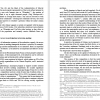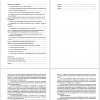Тема: Citizen participation in the process of developing and implementing a policy of information openness of local government bodies: problems of public control and public cooperation
Закажите новую по вашим требованиям
Представленный материал является образцом учебного исследования, примером структуры и содержания учебного исследования по заявленной теме. Размещён исключительно в информационных и ознакомительных целях.
Workspay.ru оказывает информационные услуги по сбору, обработке и структурированию материалов в соответствии с требованиями заказчика.
Размещение материала не означает публикацию произведения впервые и не предполагает передачу исключительных авторских прав третьим лицам.
Материал не предназначен для дословной сдачи в образовательные организации и требует самостоятельной переработки с соблюдением законодательства Российской Федерации об авторском праве и принципов академической добросовестности.
Авторские права на исходные материалы принадлежат их законным правообладателям. В случае возникновения вопросов, связанных с размещённым материалом, просим направить обращение через форму обратной связи.
📋 Содержание
Chapter 1 THEORETICAL FOUNDATIONS OF INFORMATION 12
OPENNESS OF AUTHORITIES 12
1.1. Information openness of power: essence, main features 12
1.2. Formation and implementation of the policy of information openness of the authorities in the
conditions of building the information society 16
1.3. Public control as a tool for ensuring the information openness of authorities 18
1.4. Regulatory framework for ensuring the information openness of local governments in the
Russian Federation 22
Chapter 2 IMPLEMENTATION OF THE POLICY OF INFORMATION OPENNESS OF THE
AUTHORITIES 28
2.1. Modern tools for implementing the principle of information openness of authorities 28
2.2 Implementation of the principle of information openness of authorities: regional and municipal
experience 33
2.3 Methodology for assessing the information openness of authorities 36
Chapter 3 IMPLEMENTATION OF THE PRINCIPLE OF INFORMATION OPENNESS OF
LOCAL GOVERNMENTS ON THE EXAMPLE OF THE CITY OF IZHEVSK 40
3.1 Legal basis for the implementation of the policy of information transparency of local
governments in the city of Izhevsk 40
3.2 Institutional provision of information work and information openness of local governments in
Izhevsk 41
Chapter 4 IMPLEMENTATION OF THE INFORMATION POLICY 46
OPENNESS OF LOCAL GOVERNMENT BODIES IN IZHEVSK 46
4.1 Access to information about the activities of local authorities self-government 46
4.2 Ability to control local governments 49
4.3 Access to participation in decision-making 51
4.4 Official website of the Izhevsk city 53
4.5 Citizen attempts to ensure the policy of informational openness of local government bodies. 57
CONCLUSION 60
LIST OF SOURCES AND LITERATURE 63
LIST OF SYMBOLS AND ABBREVIATIONS 75
Appendix 1 76
Appendix 2 87
Appendix 3 88
Appendix 4 89
📖 Введение
The effectiveness of interaction between state and society largely depends on the degree of information openness of the authorities, and this is what gives rise to a special interest of researchers, especially during periods of serious transformational changes.
The importance of the problem is recognized by the scientific community. Thus, during a speech in the Federation Council, the director of the All-Russian Center for Public Opinion Research, V. Fedorov, said that the Russian state, with its hierarchy and branching of power, remains a “black box” for the majority of the Russian citizens1. This statement testifies to such problems of Russian society as insufficient information openness of state and municipal governments, disruption of communication channels between the authorities and the population, and a low level of trust in persons in positions of power.
Thus, the issue of citizen participation in the process of ensuring information openness of government at all levels is particularly relevant, since it is the most important condition for high-quality communication between government and society, and therefore allows us to evaluate the effectiveness of state and municipal government.
The object of the study is informational openness of the local selfgovernment bodies.
The subject of the study is methodology for assessing the information openness of local governments.
The purpose generalization and structuring of the parameters for assessing the level of information openness of local governments, improving the methodology for assessing the level of information openness of local governments.
To achieve this goal, the following tasks were set:
- to explore the theoretical foundations of the information openness of power, revealing its essence, key features, transformation in the conditions of the information society, consider public control as a condition for ensuring the information openness of government bodies, and also consider the regulatory framework in the field of information openness.
• analyze the implementation of the policy of information openness of the authorities, considering modern tools for implementing the openness of authorities, consider regional and local practices for implementing the policy of information openness, as well as consider existing methods for assessing the information openness of government bodies and improve them.
• to assess the implementation of the information openness of the local selfgovernment body and form proposals for improvement.
The novelty of the work lies in improving the methodology for assessing the level of information openness of local governments, which allows expanding the methodology and assessing the openness of work in the information field on the Internet. Based on the results of the assessment by the supplemented methodology, it is possible to assess the ongoing work of the responsible structural unit in the direction of information work, the placement of information, materials, regulatory legal acts enshrined in the requirements of this legislation, and it is also possible to assess the qualitative characteristics of the posted materials.
The theoretical and practical significance of the study lies in clarifying and summarizing the fundamentals of information openness of local governments, which allows the presented conclusions and recommendations to be used in order to improve the efficiency of the structural unit responsible for information openness in implementing information openness on the official Internet portals (websites) of authorities.
...
✅ Заключение
The information openness policy should comply with such principles as accessibility, reliability, timeliness, publicity and openness. This policy is implemented at three levels: obtaining information, control over authorities and the opportunity to participate in management.
The main results of the study are the results of solving the tasks set in accordance with the goal of generalizing and structuring the parameters for assessing the level of information openness, which, as a result, contributes to the improvement of the methodology for assessing the level of information openness of the authority.
As noted above in the study, increasing the openness of government bodies is a priority for public administration, which helps to increase citizens' confidence in government bodies, reduce administrative barriers and corruption phenomena.
It has been established that the information openness of the authorities should be aimed at ensuring that information is public and accessible, since it primarily affects the rights and interests of citizens.
Based on the results of the study, the theoretical and methodological foundations of the study of the information openness of government bodies are summarized.
The data of the study also allow us to conclude that the current closedness of government bodies is the basis for the development of negative phenomena in the civil service: the manifestation of corruption, information isolation, lack of publicity, the target orientation of civil servants not to meet certain public needs. The need for a qualitative increase in the information openness of bodies as a whole is noted.
As a result, the key parameters of the assessment were analyzed, additional ones were identified, on the basis of which the supplemented methodology for assessing the information openness of the authorities was applied. The content of the official Internet portal was considered by the content analysis method according to the selected parameters.
The results of this study may be useful to responsible structural units for the content of the Internet portal of a state or municipal authority. The inclusion of parameters for assessing openness contributes to the construction of work to ensure access to information posted on official Internet portals more efficiently. A specific list of information is presented, the placement of which is mandatory to fully inform all interested parties, this list allows you to identify growth points in the direction of increasing openness and transparency implemented by the authority.
Summarizing, it can be noted that on the basis of our study, it is possible to improve the existing tools for assessing openness in the information space.
In addition, the study proves the hypothesis that local civil society have less opportunities to influence the level of informational openness of authorities not only due to personal or economical issues but also due to absence a special electronic tools for defending their interests even within the official website.
As example of the Izhevsk city has shown, the structure of the municipal authorities provides for the presence of departments and departments for information work, and access to information about the activities of LSG bodies is secured by a whole range of legislative acts. However, the normative fixation of the minimum level of requirements turned out to be fraught with the fact that the further development of information openness in the absence of serious stimulating impulses does not make much sense.
Practice has shown that legislative provisions alone cannot serve as a guarantee that a constructive dialogue has been established between the population and local authorities, and that the activities of local governments reflect the interests and priorities of the local community. As a result, measures to increase the level of openness are carried out formally and remain not very effective. The lack of stable and publicly available channels for timely receipt of information, dialogue between society and government structures often leads to a misunderstanding of the need for certain transformations and, as a result, to their negative assessment.
On the part of the municipality, there is a tendency to “copy” the regional and federal practice of implementing openness, which, on the one hand, unifies the policy pursued in the center and locally, but on the other hand, local authorities, by definition, should be more open, closer to the people. That is, the application of the regional and federal "recipe" is not entirely suitable for the local level - LSGs need to look for new ways and ways to get closer to their population.
In the capital of the Udmurt Republic, the main available means of communication between the authorities and society remains the use of the Internet - this is the maintenance of an official website to provide access to information and the use of social networks to receive feedback.
However, the official website is not quite adapted for a simple and fast obtaining the necessary information: it is quite difficult to find one third of the information actually available, and LSGs, in turn, have the right not to provide information upon request if it is contained in the media or on the official website. Work with appeals in social networks is not regulated in the legal field of the republic and the city, which means that appeals may not receive an official response from the authorities.
...





